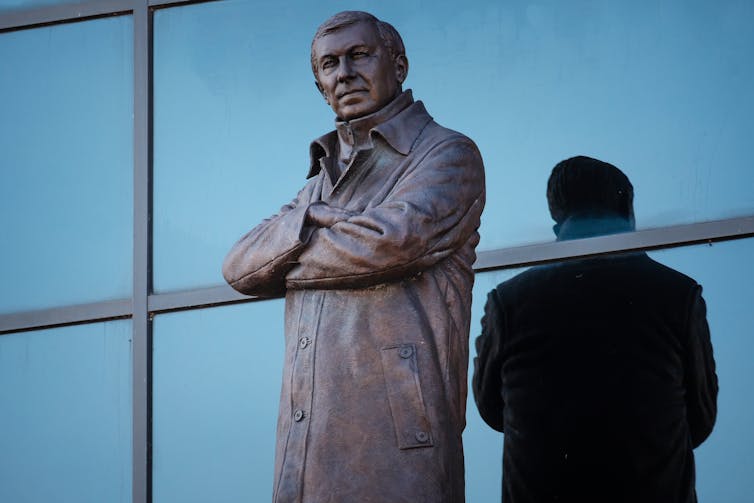the myth of the ‘all-powerful’ football manager is why so many of them get the sack
- Written by Anthony Montgomery, Professor in Occupational & Organisational Psychology, Northumbria University, Newcastle

The sacking of a top football manager is not unusual. It happens frequently, every season. The latest (well-compensated[1]) victim is Erik ten Hag, who was shown the door[2] at Manchester United on October 28 2024.
The club released a statement[3] thanking ten Hag for his work and the trophies he had won. But as is often the case, there was no mention of anyone else who might shoulder some of the blame for the team’s poor run of form.
Nothing about the CEO or the board, no mention of support staff or the players. For while they surely all share some of the responsibility for the side’s results, the default position across the sport is to point the finger squarely at the manager.
But blaming one person ignores research which shows[4] that both failure and success in organisations can never be down to a single individual. And English football’s apparent failure to understand this may be partly down to the almost hallowed status some successful managers have enjoyed in recent decades.
Enduring legends have developed around names like Bill Shankly (Liverpool), Matt Busby (Manchester United), Brian Clough (Derby County and Nottingham Forest), Alex Ferguson (Manchester United) and Pep Guardiola (Manchester City). Their characters and trophies have led to extreme levels of hero worship as a result of their teams’ achievements.
The names we use to refer to their role, like “gaffer” and “boss”, add fuel to the myth of their omnipotence, instead of seeing a manager as one piece of a complex jigsaw which includes other vital elements such as data analysts, recruitment specialists, directors of football and psychologists.
But the myth continues. And ever since the departure of Alex Ferguson in 2013, after 26 years in the job, Manchester United has been trying to find a replacement in his mould. So while the success during his tenure was lionised[5] and celebrated, his legacy actually seems to have left the club floundering.
For 11 years it has been engaged in a dysfunctional search for another “great” manager in Ferguson’s image, rather than a forensic assessment of whether the structure and culture of the football club needed to change.
Before ten Hag took the job, he was warned[7] by another of Ferguson’s successors, Louis van Gaal, to “choose a football club, not a commercial club”. Van Gaal didn’t expand on what he meant, but we can speculate that he understood that the culture of the club would not be a good fit for his colleague.
Of course, the problems that have endured at Manchester United can’t all be blamed on Ferguson. But they do illustrate the danger of attaching the success or failure of a large organisation on the shoulders of one person.
Even before ten Hag left Manchester United, there was fevered speculation about who would replace him (Ruben Amorim[8] has now been appointed). And again, the focus was on the individual, and whether he has the skills to make a success of the role.
Incoming managers (and their employers) often talk about the need to get results, and motivate the team back to winning ways. But the evidence indicates that a period of failure[9] may need to be accepted to allow for organisational culture to change and new working methods to take hold.
Manchester United’s relatively new co-owners Ineos want to change[10] how things are run, and may well have looked at how frequent coach turnover has influenced the culture of the club and the behaviour of the players towards incoming managers. In terms of finding the “best” coach, embracing this history could have been an important element in identifying the best candidate.
Organisations can be like organisms, and it appears that the DNA of Manchester United has mutated into something vastly different from the swash-buckling days of Beckham, Keane and Cantona when Ferguson was in charge.
But change takes time. Jürgen Klopp needed four years at Liverpool to win a league title, while Pep Guardiola finished his first season without a trophy for the first time in his managerial career. Manchester United waited six years under Alex Ferguson to come good. There is often failure on the road to success.
Recognising and embracing failure is an important part of building “psychological safety”[11] within an organisation – the sense that you will not be punished or humiliated for making mistakes (on or off the pitch) or speaking up with ideas. And using failure as a creative tool – known as “intelligent failure”[12] – could be a more widely useful concept in football, given that even the best sides experience it.
Instead, when teams lose, TV studios and podcasts are filled with pundits calling out individual players and demanding more leadership – but these are often knee-jerk reactions which feed an unhelpful narrative of heroic sacrifice and blame.
They often epitomise what organisational psychologists refer to as “functional stupidity”[13], where there is an absence of proper reflection or reasoning. Similarly, “stupidity management”[14] refers to trying to fix systems which repress doubt and block proper communication. Poring over expected goals statistics and completed passes have their place in the modern game, but a little more stupidity analysis could go a long way to improving the future of some football clubs.
References
- ^ well-compensated (www.fourfourtwo.com)
- ^ shown the door (www.skysports.com)
- ^ statement (www.manutd.com)
- ^ research which shows (papers.ssrn.com)
- ^ was lionised (hbr.org)
- ^ cowardlion/Shutterstock (www.shutterstock.com)
- ^ he was warned (www.youtube.com)
- ^ Ruben Amorim (www.bbc.co.uk)
- ^ period of failure (journals.aom.org)
- ^ want to change (www.manchestereveningnews.co.uk)
- ^ “psychological safety” (www.jstor.org)
- ^ “intelligent failure” (www.penguin.co.uk)
- ^ “functional stupidity” (onlinelibrary.wiley.com)
- ^ “stupidity management” (www.researchgate.net)







